Sean Singleton, Military Intelligence, Silicon Valley Investor & Air Force Veteran, Joins The Herd Has Spoken Podcast
Sean Singleton -- Military Intelligence, Silicon Valley Investor & Air Force Veteran
A long-time friend of Brad, Sean Singleton joins the podcast and talks about his journey from coastal Georgia to being a Silicon Valley investor rubbing shoulders with some of the biggest names in the industry. Sean learned from his father at a young age that he had to be twice as good to be viewed as average. Sean and Brad talk about Sean’s experience in the Air Force Academy and how his focus on relationships has allowed him to make a lot of mistakes along the way and get to a point where he’s bringing together investors, entrepreneurs, and military technology advancements -- all to keep America secure and free.
Apple Podcasts | Anchor.fm | Breaker | Google Podcasts | Spotify | YouTube
Enjoy the conversation between Sean and Brad
Brad
Sean Singleton, welcome to The Herd Has Spoken.
Sean
My pleasure. And thanks so much for the opportunity of catching up with you.
Brad
Yeah, absolutely. So you're a man that has sat across the table from some of the biggest investors in Silicon Valley. You're in the process of enhancing America's military strength and American Security, through tech, and entrepreneurship. And I'm excited to get all to get into all of that. But before we do, I want to go back to Coastal Georgia. So you grew up in the south in the wonderful state of Georgia. And I would love to hear what your childhood experience was like.
Sean
Thank you for the question. And it was a really wonderful childhood experience. And so we lived in Savannah, Georgia for the early parts of my life and eventually made our way up to Atlanta for four years, which were completely transformative. So growing up in Coastal Georgia, it's a really wonderful place. If you've ever been to Savannah, it's a pretty genteel area known for midnight in the garden of good and evil, Johnny Mercer and a host of other really cool things. Paula Dean is also a resident of the great state of Georgia city of Savannah. And so it's Justice Clarence Thomas, yet it's a very small town, very coastal. So we get a lot of international participation, but we're very stuck in our waves. And so when we went to Atlanta, and I was about 10 years old, we lived in a place that had access to just so much great opportunity. They had a program called minority to majority where African American students were able to get bused to majority white schools. And through that experience, I ended up learning about Led Zeppelin, the police and a host of other different things and also learn important, like, the important stuff, you know, the five greatest bands in the history of rock and roll, yet also got exposure to technology, media and Telecom. Some of my friends, fathers and mothers were technology executives, some had worked at Coca Cola. And so that opened up a whole new vein of what was possible out there. And then we moved back to Savannah, Georgia ended up going to a math science program, didn't necessarily want to go to a service Academy. But my dad grew up watching the Army Navy football game, and made a couple of phone calls, went through the process and ended up going to the Air Force Academy, which really sort of adjusted the complete trajectory of life. But yeah, it was a lot of fun. I still go back to Savannah as frequently as I possibly can, you know, with the Savannah College of Art and Design on there. It's just a really cool, quirky place. And I encourage everybody to get a chance to go down there. If you don't like the heat, don't go in July, August or September. But if you do like St. Patrick's Day, definitely go in March.
Brad
Okay, so lots of lots of good things to explore. In in Georgia, particularly in in Savannah, and you can't go wrong with good, good, good food from Paula Dean and good legal legislation from Clarence Thomas. So you're in good, you're good company there. But But I'd love to talk about your time in Atlanta, a little bit. So you mentioned this program, minority to majority. How, how did how did you happen to get into this program? And what what did that mean to you?
Sean
So really, interestingly enough, a cousin of mine, actually two cousins, they lived in the same house that we occupied in Atlanta, they moved out into this very affluent area in northern parts of the cap County. They were part of the program initially, and they explained to my mother, that it was a really wonderful opportunity that they had. And so obviously, my mother decided to go ahead and fill out some of the paperwork, I ended up going, following, literally in their footsteps to go to the same school. And that's how we found out about the program. Now, when we I went to a place called Vanderlin Elementary, I was one of seven African American students out of I think 2000. And so that was a really interesting cultural shock. At the same time, what I took away from that was that everybody was pretty much the same. And I still keep in touch with some of the folks from almost 35 years ago, that were there some tip of my hand as far as how old I am. But yeah, it was a really eye opening experience, because these kids had a completely different way of life, completely different sights set, and to be able to go ahead and take what I grew up with in Southeast Georgia, combine that with them, it was actually a pretty symbiotic series of friendships that have built up there.
Brad
And what age what age were you when you entered into this program? I was 10 years old, 10 years old. So at age 10, you're starting to have your own opinions and thoughts. But those those are still pretty early stage. So for you entering into this program, and suddenly being one of seven African Americans out of 1000 was was that 1000 out of 2000. Thank you was was that was that particularly challenging? Or was it just a norm that you quickly entered into and didn't really think too much about it? I couldn't see it going. Either way. And I would love to hear about what that experience was like.
Sean
Going back in my memory, the first couple of days took a little bit of getting used to yet after that first week, tell him a couple of jokes get in a couple of really awesome, cool friends. It was a pretty seamless transition. So much. So four years later, when we move back to Savannah, I was, I was upset for a number of years, because that was such a wonderful experience. And I was worried about what my life would look like, if I didn't stay in that environment. You know, you build up a lot of great friends and that really critical period of your life when you're 10 to 13 years old, and then all of a sudden be sort of forced away from that, you know, and it's not a part of your choice. Um, it took a while to get used to.
Brad
Yeah, so you go back then to Savannah, you went to this math and science program? Did you feel like you were able to fit in and connect in the same way that you could when you were in Atlanta?
Sean
So it was interesting in the sense that as I went back to Savannah, it was more difficult for me to transition back into Savannah. And the reason why is that the people that knew me, before we moved to Atlanta said I had changed Shane so much that they didn't recognize who I was not too dissimilar from what Tim Scott just suffered as a result of giving the rebuttal to the President, some by camera will dress with some of the things that were you know, passed along to me as a result of making the transition back to Atlanta to Savannah.
Brad
Sure. That's that's that's an interesting experience where you've, you've grown and evolved in a way that you were clearly very happy with. But in somehow this, this meant that people had a hard time reactivating you into the into the community, because you're, you're, you're a different man, you'd had different different experiences. And did that leave a lasting impression on you? Do you feel more connected to your time and Savannah, or did you ultimately choose to be in Atlanta? Or do you ultimately feel more connected to Savannah, because you grew up there, and then you went back there for your high school period.
Sean
So the wonderful people of Savannah welcomed me back, welcome the family back because we had been in Savannah as families for about 150 years. So it took a little bit of time, but Savannah is home will always be home, the great citizens of Savannah and Chatham County are my people. And I love getting back down there. So there is no substitute whatsoever. And it's interesting because there's a rivalry between Savannah and Atlanta. They were burned down in 1864. By Sherman, we were given as a gift to Lincoln, for Christmas of 1864. So there's always been that rivalry since then. And so southerners, we have very long memories. And so Savannah, those are my people. Not Atlanta. yet. Savannah. Those are my people.
Brad
I get it, I get it. Well, I appreciate that. Well, another person that that's extremely close to you, obviously, is is your father. And it's interesting to hear, hear that it was your father who loved the Army Navy game. And then you know, as as a son of a Navy Captain here, I have to say, Matt got confused made the mistake somehow of encouraging his son then to go into the Air Force Academy. But But what does that look like? Because you mentioned this wasn't high on your list of priorities at this time in life, yet somehow you wound up matriculating at the Air Force Academy. How did that play out? What I want to hear about how you wound up going there, even though this wasn't something that was on your radar, and you weren't excited about it, necessarily. But your father thought it was a good idea.
Sean
So yeah, again, he grew up with the Army Navy game. I mean, all the pomp and circumstance tradition. I mean, he liked the Dallas Cowboys. So Roger Staubach, the Tom Landry thing you know, Roger Staubach being a Naval Academy graduate, so you know, just some pretty pristine people, right? And so he was like, hey, my son should go there. Meanwhile, I'm applying to a lot of really awesome schools and getting into all of them and getting actual scholarship to go and so I thought I was going to have a little bit more of the Animal House experience, not wearing polyester and actually doing push ups and getting yelled at for the better part of four years. And so I got in I honestly, it was by the grace of God that I got in past the physical fitness pass the academic pass the interview, and ended up going and I'll tell you what, how infinitely unprepared I was for it. Have you ever been to Colorado Springs?
Brad
I have not been to Colorado Springs event all around Colorado Springs, but never to that city in particular.
Sean
Got it. Got it? Well, Colorado Springs is much like a coyote Road Runner, kind of cartoon as far as the landscape in the eastern part where there's tumbleweeds that go across the highways, at least back in the early 90s. So flying to Colorado Springs. Keep in mind I missed my flight from Savannah. I mean from Charleston, because the way the airports does it is that they try to give you as many legs on a ticket as possible. Cuz it's a cheaper ticket, right? Sure. So so I had five connections to go from Savannah to Colorado Springs. I go and I get something to eat, and a restaurant in the Charleston airport and the one restaurant I go into doesn't have an intercom system. And they're saying the last call for passengers from Charleston to Chicago, Illinois. gates will close in 10 minutes. Finish up my mail. I get to the gate gates close planes gone. I ended up getting in late to Denver Stapleton airport when Stapleton still existed as an airport with another 12 hours before my flight from Denver to Colorado Springs is supposed to take me down to the zoo, as we call it. I ended up befriending the Embassy Suites driver of the van I just rode around with him all night long, going back and forth doing shuttle runs between Stapleton and the Embassy Suites hotel just catching up on you know what life is like in Colorado. So the next day I get on the plane fly from Denver to Colorado Springs, which is basically a javelin throw, you know, as far as air travel goes, get off, get on the bus and there's tumbleweeds everywhere. And I'm like, where am i right now, because I'm coming from this really lush place that is Savannah, Georgia, into this really high, arid desert. That is Colorado Springs. So we get on the bus. We're all sort of shell shocked. Those of us that flew in and we're riding on the bus. And we get to the Air Force Academy. And there's a ramp there that's pretty famous if you've ever been it used to be known as the bring me man rap. They've since we changed it. And at the base of the ramp, the buses stop. And then the upper class cadets come in very tightly pressed uniforms, they get on the bus and they immediately start yelling at you to get you in shape. I looked at the gentlemen Keep in mind, there's about 45 of us on the bus and I said Excuse me, Sir, why are you yelling at us? We don't know you. The rest of the students thought that that was really funny. Haha, he did not. June 29 1990 was the longest day of my entire life because not only did this gentleman not fine, what I said funny. The other 200 upper class cadets did not find out. I mean, found out what I said and did not find it funny.
Brad
You were immortal Dooley, at that moment.
Sean
I was Mark Dooley for the next year from that moment. So that's what happened. So once you transition, and you get used to the pace of being there, some of the best friends I still have today, go back to June 29. Four years there, you hate it. Most of the times while you're there, you can't wait to see it in the rearview mirror graduation, yet you spend the rest of your life trying to get back there. Because it means that much to you.
Brad
Shine. It's funny, you should mention relationships, because you're one of the most relationally focused people that that I know. And I think that's something that you do fantastically well. And obviously, it's a big part of your your success in terms of bringing, bringing together what have historically been disparate organizations in terms of entrepreneurship and government and military and technology. But But I'm curious from from your time in your childhood, and maybe your time from the Air Force Academy, as as well. How do you think you started to develop that relational focus, because it's obviously something that's very core to who you are. And I'd love to hear kind of what you see, looking back, or the early building blocks of that fantastic relationship building skill that you currently have.
Sean
I appreciate the kind words and it's just something that's actually literally my mitochondrial DNA, I can't help it. It goes back to nursery school, I was building relationships with a lot of friends there. I got in trouble a lot. For sort of standing out
Brad
That sounds right.
Sean
Yeah, trying to represent the kids. So you know, shoot the arrows this way and leave them alone. And because of that kind of attitude, a lot of people sort of confide in you in certain things, and then that they that you have their back. And the more you can demonstrate that you have someone's back, the more than they're willing to trust in you. And for whatever reason, I just don't forget a lot of stuff. And so if you tell me something, and if I know something over here that can connect you and make you feel better, or actually help you from a business standpoint, I'm more than happy to go ahead and facilitate that conversation. Because at the end of the day, if I can help you, you're going to end up helping somebody else and we all stand to benefit from that.
Brad
Yeah, it's interesting. So one of the things that I think so important for, quote, unquote, networking, is that people always think about, oh, who can I meet? What job can I get? Where can I go? And from my perspective, that's 180 degrees different than what how you should be be approaching networking. I mean, for me the rules, the three rules of networking are, give first, give second, don't worry about what's next. And it sounds like that's kind of how, how you were you were wired and how you were thinking about things from from the jump.
Sean
Absolutely. And so when we went through recruiting to build on your point It was one of the most fun periods of time being at Business School, because it was an opportunity to get to know our classmates to get to know firms and connect the two of them. And so I love the little, you know, get to get that we would have cocktail parties and whatnot, and just sort of remembering facts about Brad remembering facts about, say, Osan Kwan or Patrick Payne and then bringing that up in the conversation to make them look good, because that made me feel better.
Brad
Yeah, absolutely. No, it's great. I mean, that's one of the the fantastic thing. So Shawn and I did go to business school together, we won't talk about the number of years it's been since we went together. But But we did go to business school together. And one of the things that's most fun is to be able to sort of brag on your your friends now and folks who are doing all these cool things. So I'm secretly you know, get giddy like a schoolgirl here getting a chance to talk with john to be able to do that. So you went to the Air Force Academy we chatted about that. Sounds like it was a love hate that skewed more towards love as the years have gone on. With respect to your your time in Colorado Springs. And I'd love to hear a little bit about after you'd graduated from the Academy, some of your work in the Air Force. I mean, some of it sounds pretty fantastic and really fascinating from from the outside in. So you're a special agent with the Office of Special Investigation. So I always knew you were a special person, Sean, but I didn't realize that we had gone gone as far as to indoctrinate that into titles. But what the heck does that even really mean to be a Special Agent in the Office of Special Investigations in the Air Force?
Sean
Well, have you seen the show? NCIS?
Brad
I have, Yes.
Sean
Okay, so the Air Force has its equivalent, the army has its equivalent. And so I was with the Air Force Office of Special Investigations after doing a three year stint in Dayton, Ohio at Wright Patterson Air Force Base on the F 22. program. And that was really fascinating texting help, and be a part of an effort to build a next generation air superiority fighter did that in Dayton loved it wanted to be in Washington, DC FOS Isaac, it's called is headquartered in the National Capital Region. So a job posted in the Air Force internal bulletin board applied for it not thinking that would get it because keep in mind, these are the people that police the Air Force. So we are the organization that's responsible for solving violent crime impacting men and women in uniform in the Air Force. Specifically, we also do a number of cyber investigations. So a lot of the cyber crimes and the cyber theft really started to proliferate in the mid to late 90s. We were sort of at the tip of the spear of that. And the area where I focused in on was more along the lines of human intelligence or counter spying. And so just being able to go ahead and make sure that American in the airport stayed safe. So did that three years active duty, six years, as of seven years, as a reservist when I separated from active duty. But yeah, that's what we do is to try to keep the Air Force safe. And we actually do joint investigations with the Federal Bureau of Investigations. our sister agencies across the services, DEA, ATF, all of them were federal law enforcement organization with a specific focus on the military.
Brad
And was that challenging for you in instances where you had to go and dig in and investigate into other men have uniform and other men and women of uniform, excuse me to, as you went went through that was was that hard to do need to investigate? Because you obviously have known how much how much hard work has gone into being able to put on that uniform and serve. But at the same time, you had a job to do as well. So what was that like in terms of going through those investigations of what it sounds like, whereas it was often peers, or one one level or another?
Sean
Yeah, so it's difficult, yet at the same time, you take an oath to the Constitution. And if you take an oath to the Constitution, and you are sworn in as a federal law enforcement officer, you need to adhere to the rules and the Constitution. And so it is, in fact, difficult at the same time to try to be as dispassionate as you possibly can be. Because at the end of the day, the facts need to remain Supreme. And you don't editorialize. In fact, they teach us if we're ever going to testify to anything that we've investigated, you don't editorialize in your reports, because it's discoverable, you don't editorialize in your notes. And most importantly, importantly, when you approach a case and you're gathering those facts, you don't try to jump to conclusions. So you really sort of have to find a little bit of your lizard brain when you're doing these things. Because you really want to go ahead and start connecting dots. Oftentimes though, the fact pattern that ultimately reveals itself to you is completely different than what you initially thought. So I think that that's probably the biggest thing is just countering what you're naturally inclined to do, as far as making a judgment versus actually investigating someone that you might personally now which has happened on a couple of occasions in my instance.
Brad
So for you What was the most memorable case that that you were On.
Sean
So this was actually when I was called back to active duty. And so I separated from active duty in 2000. And September 11 happened obviously right after that got called back to be at the Pentagon. I wanted to go to someplace overseas. Lawrence of Arabia is my favorite film, right t Lawrence is somebody I idolize, I wanted to go traipse across someplace in the Middle East with the Far East and actually, you know, be boots on the ground there. Well, since I wasn't married, and I didn't have children, they said, No, sir, you're going to go to the Pentagon. And so that's where I got us, I was to the Pentagon and had a number of really interesting cases, because as you can remember, the Pentagon was one of the destinations of unfortunately, a tragedy that visit us on September 11. And as a result of that, there was heightened sensitivities all in and around the National Capital Region. So we were always tracking, you know, movements of various folks that were persons of interest. So I can't go into too much detail yet, there were a lot of really exhilarating conversations and activities that took place in that 12 month period of being reactivated into the Air Force, that I'm really proud of working on a great team out of the Pentagon detachment for AFOSE.
Brad
Yeah, I can only imagine how much there there was there to unpack, because that was a time of such uncertainty. And part of your job and your team's job, and I'm sure across all the all the different branches of the military was to try to get that clarity, and that certainty in that understanding of what happened, how the reactions took place, and who who may have been at fault for certain, you know, aspects of things. So we want to respect I want to respect the appropriate level of, of secrecy with with that, but you did mention that you you continue to serve in the Air Force, both in an active role and then more of a reserve capacity. And then you've since transitioned out of the of the Air Force into the civilian world, although I know you're, you're the Air Force holds a special place in your heart to this day. But what was that transition? Like? Why did you decide to transition out of the Air Force? And then what were the months, like following that transition? Because I know that can be a very challenging period, for a lot of folks who've served the United States of America.
Sean
Yeah, it was definitely a period of transition, no question about it. It was actually one of the more stressful periods because not only was I separating from active duty, I was going to the Air Force Academy to become a special agent, as a reservist. And I was also doing a job search, right. And when you're military, you really don't have an understanding of what the civilian world is, I remember when I got my first paycheck, I was irate because I saw this light out and said fica, and I was like, Who the hell is fica and why they're taking my money. And so you don't have that when you're an active duty officer. With that being said, when I was on active duty, it was wonderful to wear the uniform. But it quickly dawned on me that the people that were responsible for the most impactful change in the military didn't wear the uniform. And what I mean by that is, is that people that wear the uniform are there to execute and be operational. The people that set the tenor and the tone for the Air Force of the larger God, are typically civilians, and growingly. So the people that are systems integrators or the contractors, or the Beltway bandits, I prefer to call them Parkway patriots that actually serve as the government. I wanted to go ahead and separate from active duty still stay involved as a reservist yet at the same time, go into a channel where I could have at least my perception was at the time, or greater impact on what the Air Force and the Department of Defense were going to do moving forward. So that that's why I transitioned out but it was definitely a difficult transition, because there's so much you don't know. And you have to ask a lot of questions. And you have to take a lot of advice from a lot of people that you don't necessarily know if they're right, but they have a much better perspective than you because you don't have one.
Brad
Right. Yeah, I can. I can certainly appreciate the challenges there. And one of the things that so many folks struggle with is sort of like the mental health aspect of things transitioning out was Was that something that was was hard for for you as part of that transition?
Sean
Actually, it wasn't. So when I was at the Air Force Office of Special Investigations. My boss who is still someone who I consider a mentor, his name is Francis X. Taylor, one of the most amazing Americans that this country has ever produced. He allowed me to become a thing called a White House socialite. Well, if you're familiar with the White House socialites, those are the people that give the president the Medals of Honor to pin on the recipients. They're the people with the Aggie lights that whisper in his ear, or the First Lady's ear as far as who's, what head of state they're talking to her. They're the people that operate in the background. That sort of makes sure that these large diplomatic events flow rather, in a linear fashion. So I had the opportunity to be in a White House socially for two and a half years when I was in Washington, DC. And that group of friends that were the fellow socialists, were my support group as I was transitioning out. In fact, one of my closest friends, he was the senior White House social life, his father helped get me my first civilian job. And so as a result of those relationships coming back to, was able to go ahead and actually transition out with not as much anxiety, as I think a lot of other folks would have had.
Brad
Okay, when they do, okay, yeah, so that that's not surprising that, you know, one of your greatest strengths was something that carried you through one of the traditionally most challenging parts of a military career, which is a transition out of the military. So you, you transitioned out successfully, have obviously gone through a lot of things, I want to kind of maybe fast forward through some of the years of your career, if that's okay. you ultimately want to be going back to business school, which is where we had the honor and privilege of getting to know one another initially. And then you spent some time at one of the most respected banks in the world, JP Morgan, both on the private investment side, or, and then wealth management, and then also in the investment banking side. And you've eventually sort of made your way into owning and running Oglethorpe capital, where you now have a mission that to me is something that sounds extremely important. But I'd love to hear it from from your words, where you are with Oglethorpe and what exactly Oglethorpe Capital exists in order to be able to do.
Sean
Thank you. And so Oglethorpe is the aggregation of 25 years of activity going all the way back to being a military officer, a systems integrator, an investment banker and an asset manager. So, how it all came about was this way, so ended up joining you and the rest of the cohort of 552. Booth classmates. As a result of contract engagement I had in the Department of State, there was a wonderful person who was leading our our consulting team who had gone to Darden at the University of Virginia, she was so fantastically polished in front of the client, I asked her like how does one obtain that kind of Sheen, and presenting themselves to customers and she said Business School. And so she was my Sherpa through the entire process of eventually going to booth and meeting up with you and the rest of the rest of the team there. And when we went through recruiting, as we alluded to, the recruiting piece was a lot of fun, the figuring out what you're going to do post graduation is the hard part.
Brad
Absolutely.
Sean
And being the former Air Force officer systems integrator in the National Capital Region, you don't have tax and business strategy, you don't have generally accepted accounting principles that's not in your common vocabulary. So it was rather difficult to go from zero to 60, in the span of two years to get even qualified to work at JPMorgan yet, was able to go ahead and pull it off. And as a result of some of that corporate finance experience, and then transitioning over to the asset management side of business, got a pretty robust picture of what individuals and corporations need to do in order to be successful in the long term. And when I eventually came out to San Francisco to be with my now wife, I was working for JPMorgan on their investor desk in downtown San Francisco, when one of my former clients approached me and said, Hey, if you decide to go off and hang out your own shingle as a boutique m&a advisor, I will go ahead and be your first client. And that's all Oglethorpe came to fruition in January of 2013. And the focus of Oglethorpe is to actually help micro and small cap companies have liquidity events, through engagements in dual use activities. And what I mean by dual use commercially focused companies that are willing to take on Department of Defense or public sector use cases. So if you're a cybersecurity company, and you're focused on the financial sector, like a JP Morgan, or Goldman Sachs or whatever, you're doing some really cool things in the cyber domain that God cares about, right? Those big bulge bracket banks or sizable banks are dealing with trillions of transactions on an annualized basis. God is not dealing with the same volume yet the information is more sensitive, and have a national security import. So being able to go ahead and help these companies bridge that divide is where Google Places its time and attention, and spent a lot of fun and if you go back to the origins of Silicon Valley, it was actually due in part to either the space program or the nuclear program. You have roughly around the late 80s God decided to drop Mike in Silicon Valley and left this treasure trove of intellectual property that folks like Steve Jobs, Steve Wozniak, and the rest is sort of picked up and aggregated and brought to you iPhones and all the other different things. In fact, there are 47 different pieces of intellectual property that you and I paid for as taxpayers that went into the iPhone. And the DOJ and the federal government gets not one cent from that sitting of the investment. So I'm trying to change that in a very surreptitious way. Because as you can imagine, there are a lot of firmly entrenched interest. But using relationship skills and sort of bridging these divides trying to get Wall Street, the National Capital Region, and Silicon Valley get on the same sheet of music.
Brad
Yeah, and I guess that's a that's a mighty job. But it's a it's an important job. So one of the things that I know you've shared with me previously, is, when we're when we're talking about America's military might, and where the United States stands relative to other nations. There's a huge need to develop technology, and innovation through entrepreneurship, but in a way that can be at scale and with sufficient capital, to be able to not just have America at parity with other nations and superpowers, but to be able to be above parity with that. And so you have you have crafted this very lofty goal over over time, and certainly appreciate that your goal is to be able to help the small cap and mid cap organizations be able to have those liquidity events with Oglethorpe through that dual use that you mentioned. But how did you come to take on, you know, such a weighty goal and be able to start getting in the room with so many of these huge Silicon Valley investor. So, you know, we've talked about your journey from Coastal Georgia to Silicon Valley. But it's not as simple as arriving in Silicon Valley, and being able to have these doors open to you. And let's let's be honest, particularly as as a black man from from Georgia, there's some real structural challenges associated with being able to get there. So how did you start being able to get your foot in the door just a little bit and then continue to expand in the world of Silicon Valley?
Sean
Wow, it's like Paul McCartney wrote Long and Winding Road No. And it really happened because of the Air Force Academy. I'm not gonna lie to you on so when I came out to San Francisco to be with my now wife, and we went to an Air Force Academy event. And as I was looking to do something a little bit more interesting, at least in my mind through Oglethorpe ended up going to a reception with a gentleman who unfortunately passed last November, but he was a class of 71 graduate by the name of Bill Coleman. Now, if you remember a middleware provider, called B EA systems, the B in BA systems, which was sold to Oracle for $8.5 billion, the B was Bill Coleman. Bill was somebody who took me under his wing and introduced me to one of his investing partners, Jim by the name of Gilman Lewis, who was the first CEO of Inc. And he's doing a phenomenal job with Alsop Louie. He was also on the recently convened National Security Commission on artificial intelligence, one of the commissioners there, and between the two of them and a couple of other folks with Air Force backgrounds, they actually got me into some conversations that was eminently unqualified for, but I tried to be it's a fly on the wall and take in as much as I possibly could. Because of some of the activity that was done through those gentlemen. And then also some of the activity that was done with Oglethorpe, I had a wonderful opportunity of coming to a thing that's now known as the defense innovation unit. De IU. At the time, it was di UX, the defense innovation unit experimental. And getting back to the origins of Silicon Valley know you're going to ask something
Brad
I was Yeah, this defense innovation unit. So that sounds that sounds like something that's that's very fascinating, when you got introduced to it. Just Just to clarify the timeline. This was after your time in the Air Force Academy. This was after bill Coleman and sort of introduced you to this to this world. And then you discovered this defense innovation unit. Am I am I tracking you correctly here?
Sean
Absolutely. And just sort of put a timeline to it graduate from Air Force Academy in 1994, six years active duty six years in the National Capital Region, as a systems integrator, come to booth, graduate five years of JP Morgan. So now it's 2013 2014. I'm in the valley, and I'm having these conversations. And one of the things that was happening roughly around this time is that God recognized that they were so woefully behind our peer competitors or nuclear competitors at the time, the Chinese and the Russians. And the only way that we were going to claw our way back is to harness the great activity and energy that was happening innovation ecosystems around the country. So the 128 corridor and Massachusetts, you know, they're in the beautiful state of Michigan National Capital Region, Central Texas, Front Range of Colorado, and specifically out here in Silicon Valley in the Pacific Northwest. And so there were a number of convoys coming out from the Pentagon saying, how do we get you to work better with us, Silicon Valley. And that's how As a fly on the wall with a lot of these conversations, these conversations culminated in the creation of de IU x at the time in August of 2015. Now, like most startup ups, the initial plan, ends up becoming at something that the entity pivots from. And so di UX, when it was created in 2015, was to be a embassy model to where if you had great tech, you would come and talk to us. There are going to be representatives from all of these government agencies, and they were going to go ahead and figure out how to wedge your tag back into their enterprise. Sure, not and a half months, the organization did that. But continue, please, no.
Brad
So you basically said, Hey, we have this great idea. We have the military, we have connections and the people who recognize the problem at the Department of Defense in terms of needing to drive technical innovation. And then we have connections with a bunch of these startups, we can do our best to get all these startups together in one room with do with the Department of Defense. And that was basically the initial concept. Correct.
Sean
That was the initial concept that was a glaring failure. And what ended up happening was, and this is still something that plays the Department of Defense in the federal government, it's infinitely impossible to wedge new technology into legacy business processes. Sure. At the end of the day, de IU now is more McKinsey, Bain, or BCG, or an Accenture than they ever will be a tech forging operation. And the reason why I said is because you have to re engineer a business process, understand what mission outcomes you want to have, and then find the technology that actually reinforces that reengineered business process. It took us several years to figure that out. And as a result of figuring that out, I got exposure to the folks at Andreessen Horowitz, Kleiner, Perkins, Sequoia, and NEA, which is where I have probably the most robust relationship unifies associates, one of the biggest, biggest venture capital firm in the world. And
Brad
I just want to interrupt you here, because for those who aren't familiar with Silicon Valley, I mean, this is the New York Yankees, the Green Bay Packers, the Dallas Cowboys, all in one of Silicon Valley that the challenges listed off. I mean, these are the heaviest of the heavy hitters in Silicon Valley it from an investment perspective. I mean, basically, every, every large tech firm of the last 20 years that has had venture capital investment has had one of these organizations funding them. So I just want to share that perspective as you go through your story here, because this is no small accomplishment to be able to list off this list of venture capital firms.
Sean
What's been a true blessing. In fact, one of the people that I mentioned earlier, was in the room with john Doerr, when this individual came in with this really cool concept after you left his role on Wall Street, for selling books online. And so this individuals in the room when basis pitch his idea for Amazon, and so being able to tap into that level of expertise has been really wonderful, as I've built on overbore, trying to do what I'm doing on the dual use space. And all of those firms care about keeping the USB on parity, which has been really encouraging to sort of see that we're more alike than we are different.
Brad
And along those lines, right, because because I do think this is an important topic that I want to want to make sure we get a chance to chat through a little bit. So how has the journey in this venture capital world been harder? As an African American man, were there few people sitting around the table that that look like you?
Sean
I'll say to you like this, they use the term unicorn to describe companies. Yeah, it's it's pretty much like that. I mean, a group of us get together on a periodic basis. And we talk about how do we increase the amount of, you know, brown and black participation on Sandhill road, which is the Wall Street equivalent in the venture space? And, you know, it's going to be a long slog. I mean, Andreessen Horowitz has put together their cultural leadership fund where they have folks like Kevin Durant's, Shonda Rhimes, and all of that, leveraging their great half as entertainers to get greater exposure to tech, yet it goes even deeper than that, of how do you go ahead and take folks that are graduating from booth stand for HBS, that might go to Wall Street that are brown and black, to at least look at Santo road, and actually work with those firms to understand that there's great benefit and diversity of thought, where you can actually probably have greater rates of return and multiples on the invested capital, if you have various perspectives into there. So that's another passion that actually sort of is riding with what I'm trying to do from a dual use public private sector collaboration standpoint. But yeah, it's difficult. At the same time, if you can demonstrate value in this country, people want people in the team that can actually drive returns and so you always have to lead with that, of how can I make the enterprise better? How can I make the fund actually appreciate more? How can I help these companies realize value quicker if you do that people could care less what you look like on the outside.
Brad
Yeah, and I think one of the The great pieces of data that exists is that we know, when you have an executive team, or you have a board that's more diverse, the returns are better, right? So when you when you have a board or an executive team of all white men, the returns are not as strong as when you have people of color. And when you have women in these leadership roles. So there, we all know that data exists. And and it's out there yet, there's still this challenge. And there's still this inertia, that that exists. I actually think like, this is where the relationship piece is, is a double edged sword. So someone like you, Shawn, you know, use the term unicorn to describe Yes, investments, but of course, you as well with your, with your relationships that you've started forging, in your, in your mitochondrial DNA to use your term from the day that you were you were born. But those relationships, while they're really important, and I don't want to ever discount relationships that people have, but they have the impact of let's just keep it from a business and a dollars and cents perspective of limiting the returns of these companies. Because you have your leadership, that looks way too way too homogenous. So that's one of the things that's been most head scratching for me, and from my perspective is that there is the data that's out there, I think people intellectually understand the data, yet, it's still really hard to be able to move the needle, and change the way things have happened for so long, because of the relationship. So yeah, I don't know quite where I'm going with this, other than to say, it feels like the relationships are both a one of the strongest assets of Silicon Valley, to be able to have one place to get this fantastic deal flow. But it's also one of the biggest issues and biggest challenges that exists in in Silicon Valley. And I'm very happy that you're out there trying to trying to solve that. But I would love your take on what does the future look like when we look out 234 510 years when it comes to making investments and trying to do so in a way that has better returns associated with more diversity in those investments in those leadership teams.
Sean
Oh, I appreciate you sharing that perspective and context, it's going to take execution, it's actually going to take the realization of some liquidity events that people take notice of right, that's the beautiful thing about numbers is that they don't lie. And so if you're able to go ahead and have a couple of material deals, and you're known as the person or group of people that were responsible for having a company that was valued at say, maybe $500 million into becoming valued at 5 billion in the span of 24 months, because of the material things that you have contributed to the conversation, that will turn some heads. And then when you start develop a reputation, and it's not too dissimilar from wall street of being the guy or the lady responsible for x, y, and z, people will find you and they will definitely become colorblind as time goes on. It's very similar to what happened in 1947. with Jackie Robinson, you know, there are a lot of folks that just said, Hey, and I'm not comparing myself to Jackie Robinson at all. So please do not take that from from this at all.
Brad
My point is, you can't swing a baseball like jack, a baseball bat, like Jackie got even close.
Sean
One is fast, wasn't as charming wasn't nearly as patient. With that being said, being someone who can demonstrate value that can actually help the team win really sort of gets a number of the other investors and some of the other portfolio companies to sort of take a second look. And to understand that going from the ethereal that we understand what the research says that diversity works to the actual is what's going to be what it takes to change and move the needle.
Brad
I love that. I love that. So so for you what what what's next? Right, so what what are you planning to continue to do with with Oglethorpe with your role I know, you know, the greatest thing you can do is to be successful in your quote unquote, day job. And I know you're working across so many different things. And you're a man that that sleeps very, very few hours to get to get that done in another day. I'd love to cover that in more detail. But we'd love to hear kind of what what's next? How do you see things advancing going forward both for you and what you're trying to accomplish and the industry as a whole.
Sean
So over the next 12 to 18 months, they're going to be some really big announcements is what my vision and hope happens to be. I think as a result of what we as a world went through, specifically this nation over the last 14 months, there's an acute sensitivity to make sure that we all ensure a number of critical things to maintain an American way of life. And so I'm involved in some of those conversations of how do we go ahead and Increase the collaboration between the public and the private sector. So we don't find ourselves flat footed in the future. Right. So there's going to be some announcements on that. I love it. They're also going to be some announcements is which is where I'm focused Oglethorpe attention today is the maximization of human performance. And so a couple of the companies that I represent are ones that are building an augmented reality contact lens, right. So if you remember what Tom Cruise did in minority report, be able to give advertisements tailored to his retinal image. We're doing that with one of the companies I'm involved with. I'm also involved with another competent this director, consumer hearing aid company, I'm involved with a company that's actually working with high school students to actually make them more financially literate and get them introduced to the stock market a lot sooner. So the hope is over the next 12 to 18 months, you're going to see a lot of announcements, talking about the own shoring of critical capabilities and technologies. And then you're also going to see some really awesome announcements as relates to, you know, people being better because of some of the innovations coming out of Silicon Valley in the state of California, other places across the country, that are really focused on maximizing people's engagement with their surrounding environment.
Brad
I love it. I love it. Well, we can't wait to stay tuned and to see see what's next for for you in your mission as a whole. Well, we're, we're very thankful to have you as part of the MuskOx herd and you've been generous with your time. But before you do go, I've got a I got a couple final questions for you here, Sean. So what is your biggest pet peeve?
Sean
People not trusting their instincts, and then end up making decisions that are counter to their own benefit. I would love for people to not only gather the data, but actually interpret the data as far as what it means to them. And even if it runs counter to what it's telling them to do always trust their gut. I think if we trust our guts a lot better, the world would be a much better place because we're actually more in tune with the environment and more in tune with others around us. But so that's one of the biggest pet peeves that I have.
Brad
And I think that's so important is that your gut is not just a one off feeling. It's an aggregation of all of the knowledge that you've accumulated in a way that we're not smart enough as humans to necessarily be able to articulate always, but the end result is there in your gut. I think that's fantastic. It advice. And speaking of advice, would love to hear the greatest piece of advice that you've received from someone else, Shawn?
Sean
Yeah, and I think we've shared this, well, I'll say it like this. When I was a young kid, my dad pulled me aside and said, just because of your exterior, you're going to have to work twice as hard. And that piece of advice is stuck with me to this various very, very day, which is the reason why would I go to North decap County and I'm seven out of 2000, or go to the Air Force Academy or transition back into civilian life or then come out to Silicon Valley, the transitions haven't been as difficult as it could be. Because always keep that in the back of my mind from what my dad passed along to me is that as long as you're bringing your A game, people are going to judge you on your A game. And they can fault you for anything less and charming. What an amazing perspective that you have from from your father along those lines. I mean, I think addressing the fact that there is a lot of truth to that is, is something that's really hard and really unfortunate. And I'm very grateful that we're doing a lot these days, as a society to be aware of that and to drive change. But to me, that's almost a different topic in a very meaningful and meaty topic. But the fact that you and your family have just recognized the reality and taught you about the need to just be such a fantastic human to be able to make so many things happen is is impressive that you've been able to, to bear that weight on your on your shoulders, and to be so successful. And to make so many people's lives around you so much better. In spite of that. It's been like such a such a blessing, maybe Who knows, maybe it's because of that as as well. But I think that's a great piece of advice. I wish that wasn't something that had to be a reality. But it's very impressive that you've you've had that as as a backdrop and being able to think in that mentality in such a way that's allowed you to go to the Air Force Academy, to be successful there to have these contacts to be able to work across Wall Street and now Sand Hill Road and to be able to drive change, it's going to further bring together everything across across your background of work between entrepreneurship and investment and the military. So I couldn't think of a more fitting way to end and then that fantastic piece of advice that your your father had shared with you.
Sean
Oh, you're too kind, sir. And thank you so much. And it's because of friends like you and having great relationships over the course of life that we all collectively gets someplace much better than where we came from. So thank you for the opportunity to sit down and talk.
Brad
Thank you, Shawn. And we appreciate you joining The Herd Has Spoken at MuskOx. We'd like to say that we're strong as individuals, but we're better as a herd and we're very thankful to have you as part of the MuskOx Herd. So until next time, thank you very much for joining us, Sean.
Sean
I appreciate it. Brad. Thank you so much for your time.
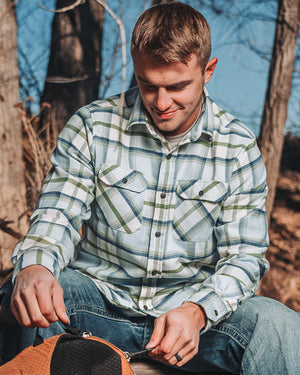
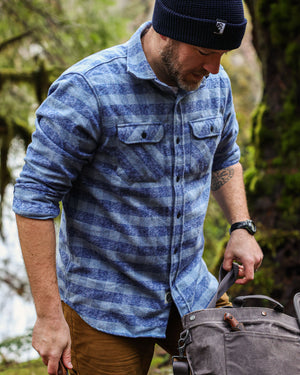
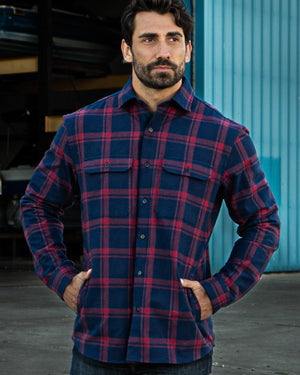
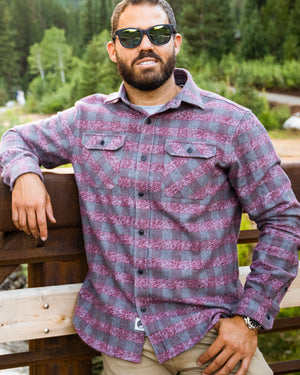
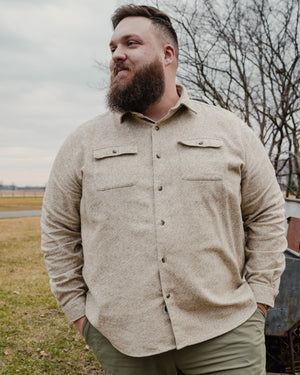
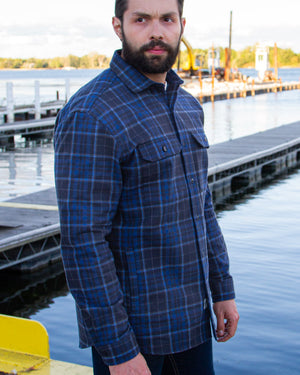
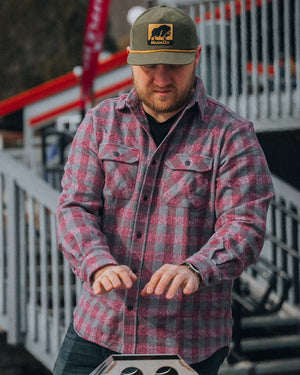

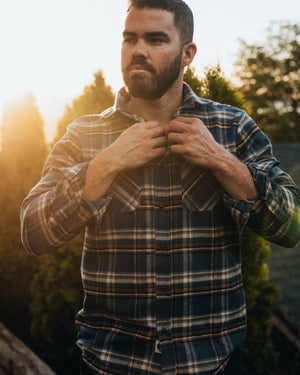
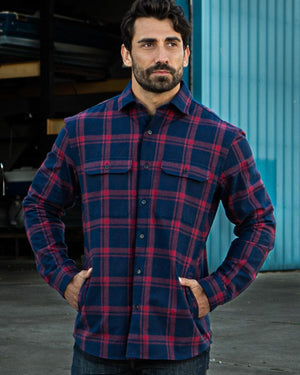
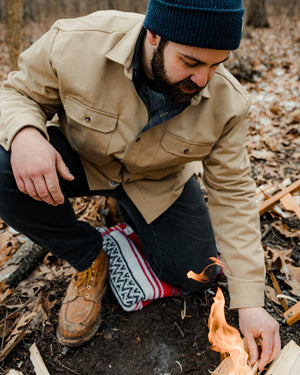
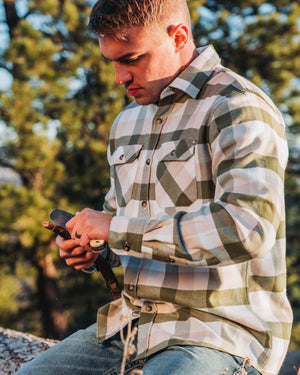
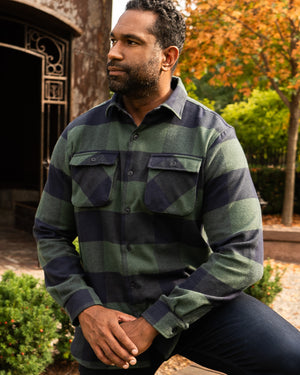





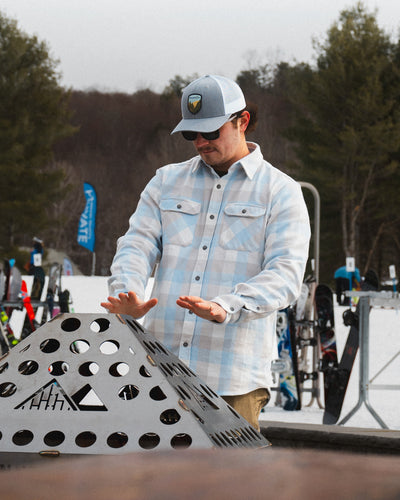

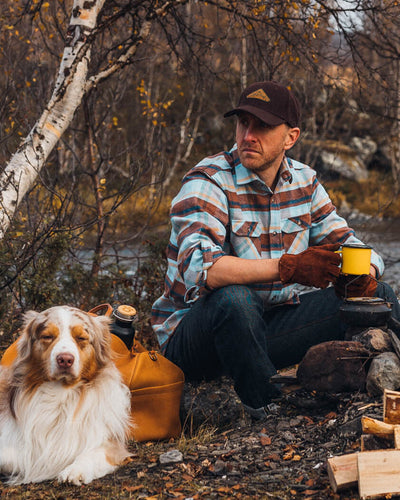

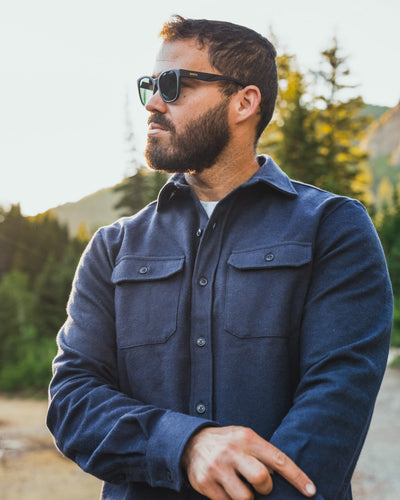



Leave a comment